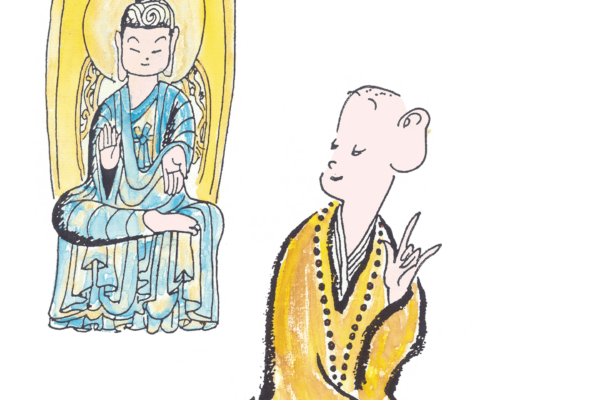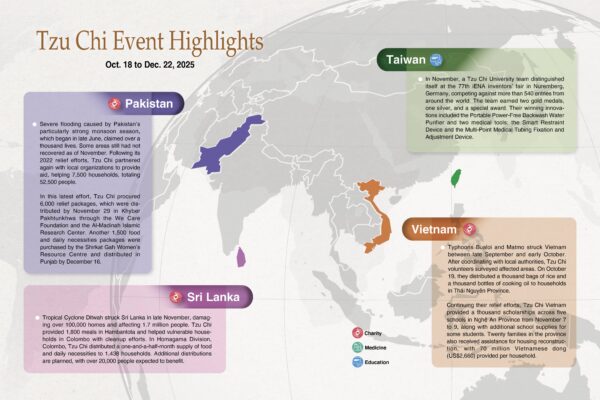By Liao Zhe-min
Translated by Wu Hsiao-ting
Photos by Huang Xiao-zhe
Tzu Chi’s Summer Nutritional Support Program during the pandemic benefits more than underprivileged students and their families—farmers and taxi drivers gain as well. It’s a powerful example of how different sectors of society can work together to accomplish a mission of love.
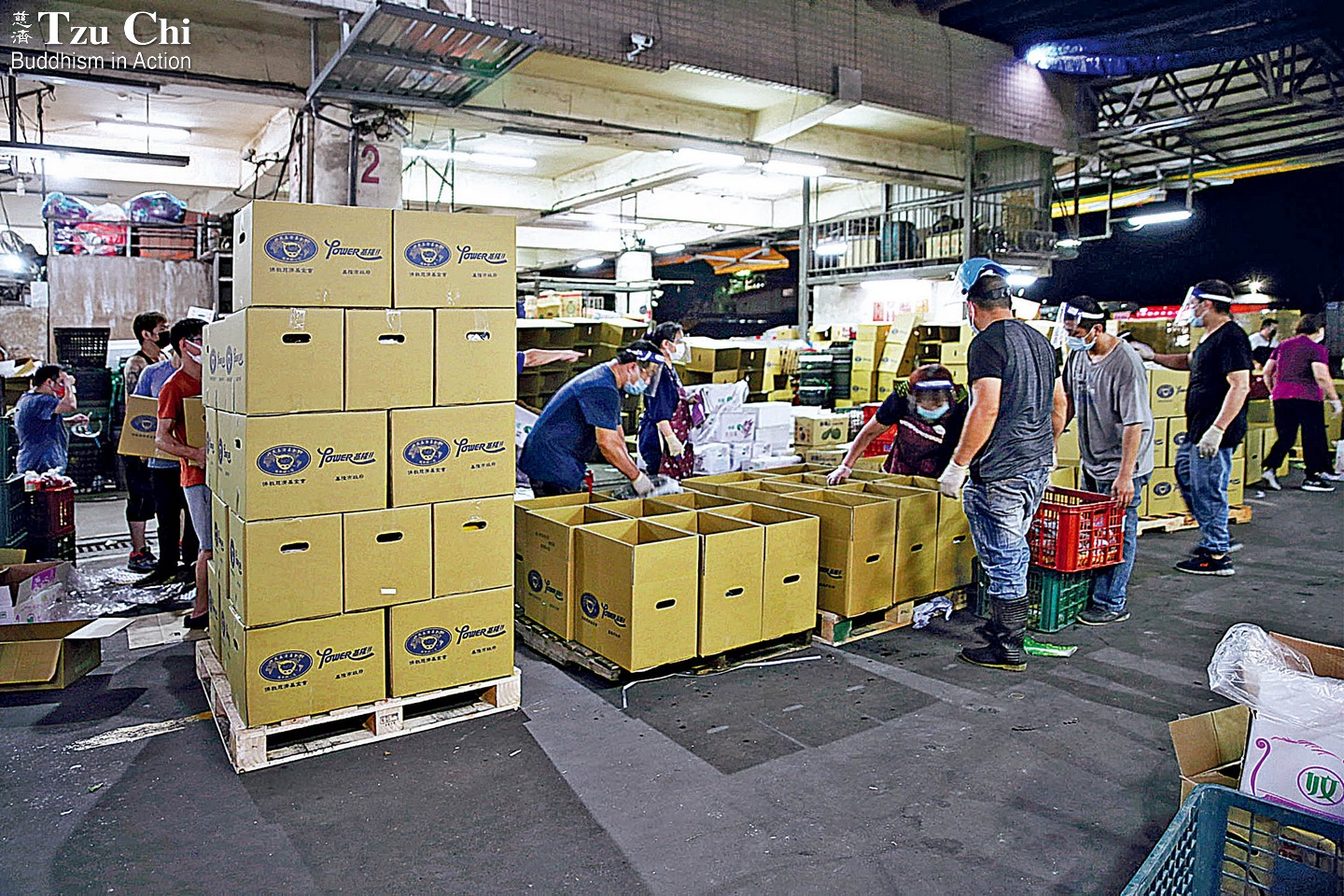
Vendors pack fresh produce into boxes at the Keelung Fruit and Vegetable Wholesale Market in Keelung, northern Taiwan. The boxes are headed to needy families. Ye Jin-hong
On a quiet morning, a taxi pulled over to the side of a road in Zhongzheng District, Keelung City, northern Taiwan. The driver, Mr. Wu, got out of his car and called out to a nearby house: “Anybody home? Mr. Chen, please come out and get your supplies!”
A boy of junior high school age emerged from the house in response to the call. Seeing him, the taxi driver added, “There’s a lot of stuff here. It’ll take two people to move it in.” While the boy fetched his mother to help, Wu began to move a couple of heavy boxes from his car. The boy and his mother then got busy lugging in the boxes.
“Okay, that’s it! Please sign here,” the driver said while handing over a delivery receipt for the mother to sign. The grateful woman couldn’t stop thanking Mr. Wu. The delivery to the family done, the taxi driver returned to his place behind the wheel. There were a few more families on his list to deliver to, and he didn’t want to waste any time. He took out his cell phone and called the next family to let them know he was on the way, and then he left for his next stop.
The boxes Wu was delivering had originated at the Keelung Fruit and Vegetable Wholesale Market. Earlier that morning, at 2:30, the market was all hustle and bustle. Vendors, their families, and volunteers were inspecting more than 10 kinds of vegetables and fruits before packing them into 1,640 boxes to be delivered to underserved families in Keelung City. Dawn had broken by the time the enormous task was done, by which time another 1,600 care packages had arrived from Tzu Chi headquarters in Hualien, eastern Taiwan. Each set of food aid to be delivered consisted of a box of fruit and vegetables, two five-kilogram (11-pound) bags of rice, and a care package containing multigrain powder, noodles, and 11 other items. Nearly a hundred taxis and vehicles from a catering company had been enlisted to help make the deliveries and were now lined up on-site, ready to go.
Beneficiaries: disadvantaged schoolchildren and their families who have been impacted by the pandemic in 15 cities and counties in Taiwan
Aid Provided: each set of food aid includes a care package with 13 items, a box of fruit and vegetables, and two five-kilogram bags of rice
Participating Cities and Counties: Keelung City, Yilan County, Changhua County, Yunlin County, Chiayi City, Chiayi County, Tainan City, Hualien County, Taipei City, New Taipei City, Taichung City, Pingtung County, Hsinchu County, Nantou County, and Kaohsiung City
Feature: An inter-agency project that combines the efforts of charitable, educational, agricultural, and transportation sectors of Taiwanese society
In mid-May, a spike in domestic COVID cases prompted the Taiwanese government to elevate the pandemic alert to level three, the second highest level. The partial lockdown that resulted affected businesses and industries across the board. According to statistics released by the Ministry of Labor on July 8, 2021, the number of businesses forced to cut their work hours due to the pandemic topped 1,800, and the number of people working fewer hours surpassed 25,000. Because people avoided leaving their homes, roadside stall owners and restaurant operators and workers, among others, saw their business seriously affected too. Their incomes were drastically reduced as a result.
“Parents of underprivileged students have likely seen their incomes affected the most by the COVID crisis,” said Julia Lin (林祝里). Lin leads the Keelung City Government’s Department of Education. She talked to Tzu Chi about the possibility of distributing meal vouchers or food to underserved students. “I wanted to help the students get support from society so that they could at least have enough food to eat during this trying time,” she said.
When school was suspended because of the pandemic, getting enough to eat became a very real concern for many students from low-income families. Many cities and counties in Taiwan issued lunch vouchers or arranged for these students to receive boxed meals at their schools so that they wouldn’t go hungry during the day. Such efforts covered their lunches, but Lin requested Tzu Chi’s help so that these students didn’t have to worry about their dinners either. The foundation decided to go even one step further.
“We felt that providing food to the students didn’t go far enough,” said Yen Po-wen (顏博文), CEO of the Tzu Chi charity mission. “We wanted our help to cover their families as well. To help keep kids healthy, we decided to provide fruit and vegetables in addition to other kinds of food.” Yen explained that 75 percent of the budget the foundation allocated for its charity work in Taiwan in 2021 was to help people through the coronavirus outbreak. That included nutritional support for schoolchildren and helping underprivileged students access on-line learning.
George Chang (張濟舵), deputy CEO of the Tzu Chi charity mission, said that the foundation actively sought to expand its scope of care when coronavirus cases began to surge in Taiwan in mid-May by joining forces with government departments. “We often collaborate with social welfare departments, but this time we’re working more with education departments across Taiwan to implement our nutritional support program for underserved schoolchildren. Those in the education system know the situations of the children the best.”
After intensive preparations, Tzu Chi reached an agreement with one local government after another to carry out the summer nutritional support program in their area. All told, schoolchildren in 15 cities and counties across Taiwan will benefit from the project. Vegetables, fruit, and other food will be provided to them and their families in July and August. The program kicked off on June 28 in Keelung City, with the other participating cities and counties following close behind in early July.
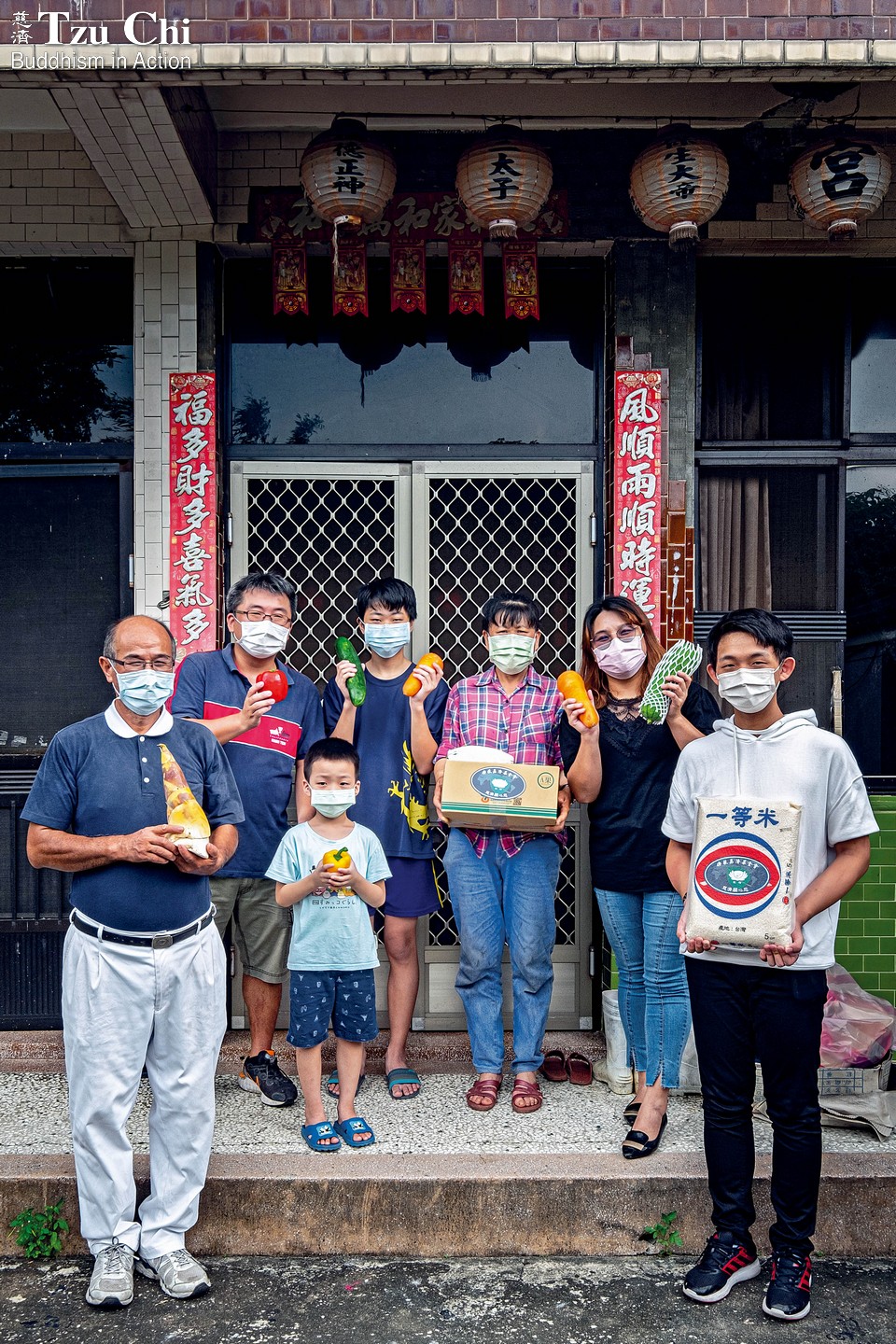
A household in Nanhua, Tainan, southern Taiwan, received food from Tzu Chi in early July 2021 that was enough to last a small family for a month.
Keeping children fed
Chun (a pseudonym) lives in Keelung. She has 11 children. The oldest is fulfilling his compulsory military service while the youngest is still in kindergarten. The mother and her husband make a living by constructing formwork at construction sites and doing cleaning work. Their work, however, dwindled as the COVID situation in Taiwan escalated. The burden to feed their large family was weighty. It’s easy to imagine Chun’s happiness when she received the food aid provided by Tzu Chi in late June.
Because her family is so large, school administrators had applied for double food aid for them. In addition to two boxes of fruit and vegetables and four five-kilogram bags of rice, they received two care packages, each containing red quinoa and brown rice powder, soybean milk powder, vegetarian meat floss with seaweed, seasoning paste, noodles, multigrain pastry, and other items. Each care package also included a letter from Dharma Master Cheng Yen wishing the recipients well and a copy of Jing Si Aphorisms, a collection of short sayings by the Master.
Chun set about inspecting the delivered items as soon as they arrived. “Cabbage is pricy now!” she exclaimed. “Thank you so much. There is such a rich variety of food here. All of these vegetables are things my kids like to eat. They love my stewed mushrooms and Chinese cabbage!”
Nanhua District, in Tainan City, southern Taiwan, is in a mountainous area. The district produces a lot of mangos and longans. Many residents support themselves by growing fruit or doing odd jobs. Zheng, a student who lives in Nanhua and who attends the local Nanhua Junior High School, is a beneficiary of Tzu Chi’s nutritional support program. He has a mentally and physically disabled sister, and his father doesn’t have a steady job. Chen is another student from the same school as Zheng. Her mother originally worked in the Tainan Science Park but had to quit her job because of illness. She now works odd jobs along with her husband at construction sites or orchards. Of the 5,800 needy families in Tainan enrolled in the nutritional support program, eight households were referred to Tzu Chi by Nanhua Junior High School.
In early July, Tzu Chi volunteers transported the care packages and boxes of fruit and vegetables intended for the eight families to the school, then helped school administrators deliver some of the food to those households that couldn’t come to the school to pick up the aid. Everyone worked together to help ensure that underserved families did not go hungry during the pandemic.
Students and their families enrolled in the nutritional support program received food from Tzu Chi in different ways, depending on where they lived. Care packages in Taipei City, northern Taiwan, for example, were delivered to schools for parents to take home. Shopping vouchers were given to participating families with which they could buy fruit and vegetables at supermarkets.
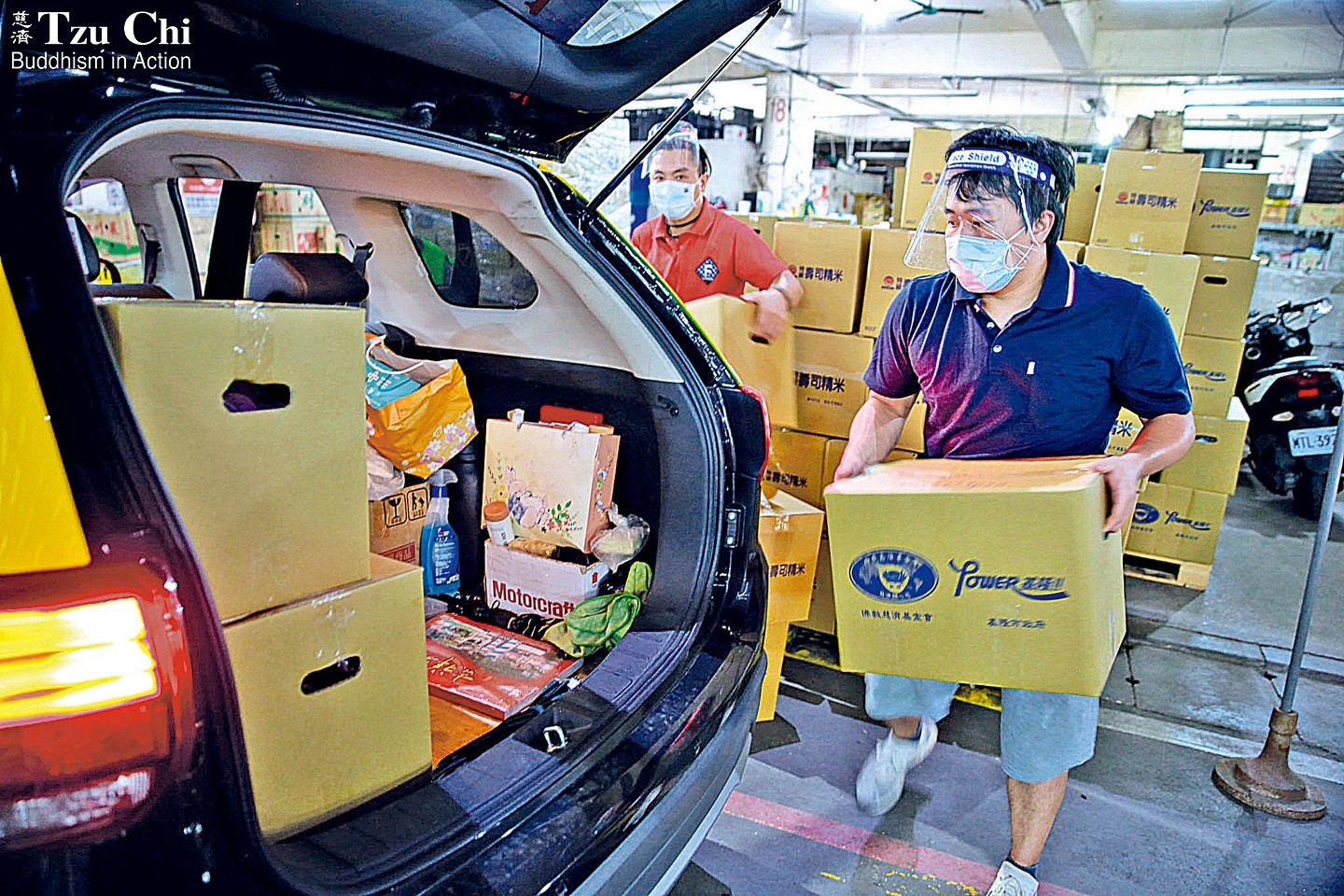
Tzu Chi’s food aid was delivered in different ways to families in different cities and counties. In Keelung, taxi drivers were engaged to make the delivery trips (left, photo by Ye Jin-hong). In Tainan, volunteers transported care packages to 269 schools in the area (right). School administrators then notified parents to come to the schools to take their food home. Volunteers helped deliver care packages to families that couldn’t come to the schools to receive their share of the goods.
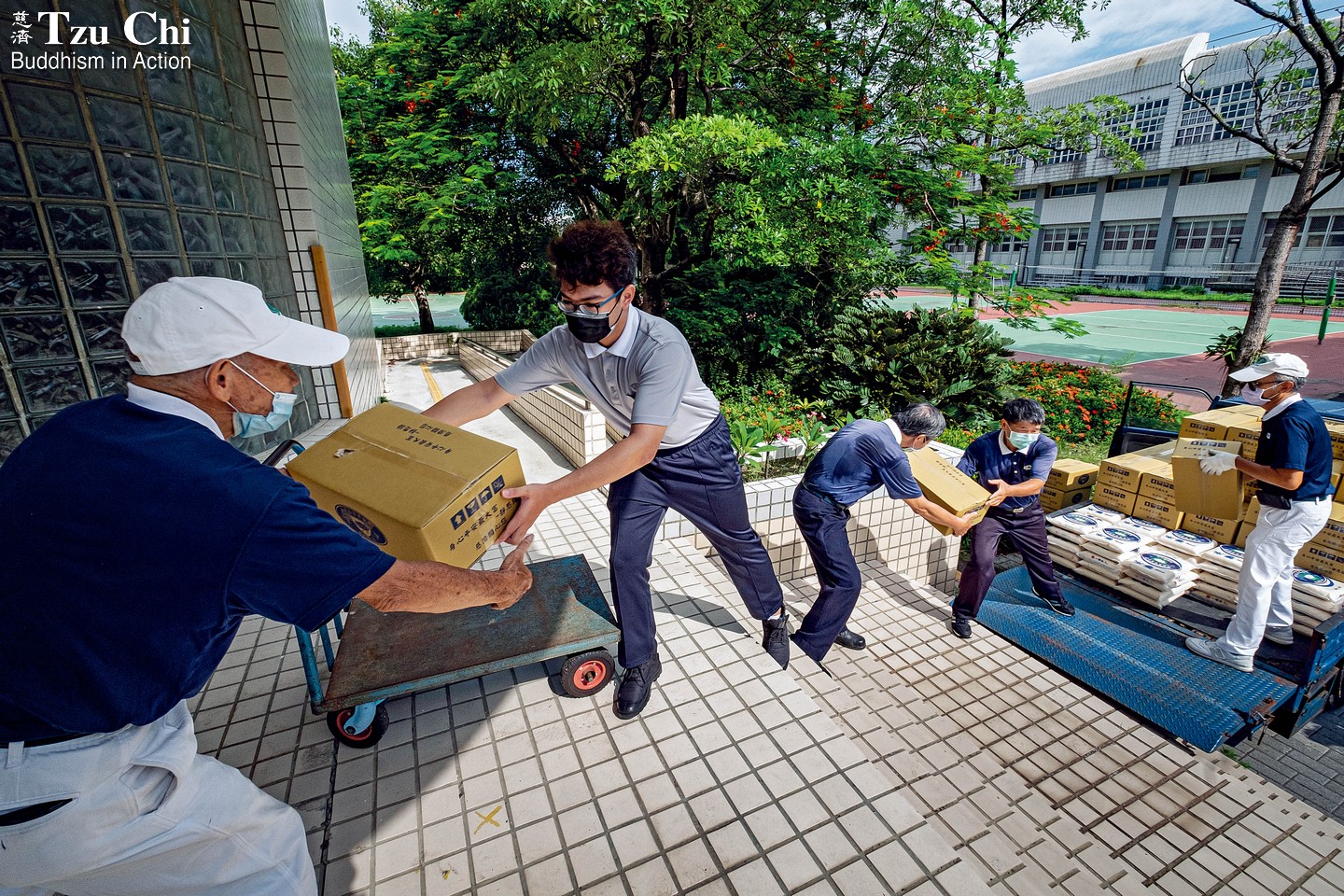
Help with online learning
In addition to helping vulnerable students stay fed, Tzu Chi aided with their on-line learning when in-class instruction was suspended as a result of rapidly increasing coronavirus infections. Remote learning began on May 19, even though some students lacked the needed resources to support their at-home learning.
The squeeze that lack of resources put on students and their families is illustrated in the example of a noodle stand vendor in Zhongshan District, Taipei. The vendor was a foreign woman who had settled in Taiwan after marrying a Taiwanese man. She and her husband were separated, and business was bad due to the pandemic restriction measures, so she had no choice but to fall back on her savings to get by. Tzu Chi volunteer Guo Mei-ying (郭美英) had been extending care to this woman for some time. Guo had phoned her several times after the COVID alert was raised to level three to check on her but could never reach her. It was only later that Guo discovered that the woman didn’t have her cell phone with her—her child was using it to attend his on-line class.
Guo quickly applied for a subsidy from Tzu Chi to purchase a notebook computer for the family when she learned about the family’s situation. When the woman’s child received the computer, he said sweetly, “I’ll cherish this computer. And I’ll study hard and be a good child. When I grow up and have the ability, I’ll help people in need too.” Guo was greatly comforted by those words and was delighted to have connected the family to help during this difficult time.
To help make sure that schoolchildren were not deprived of their rights to receive an education during the pandemic, Tzu Chi worked with educational departments in different areas of Taiwan and with other organizations to provide 15,000 wireless routers to children who had no access to the Internet at home. Tzu Chi rented the routers for two months so the children in the program could use them for free to access their schoolwork.
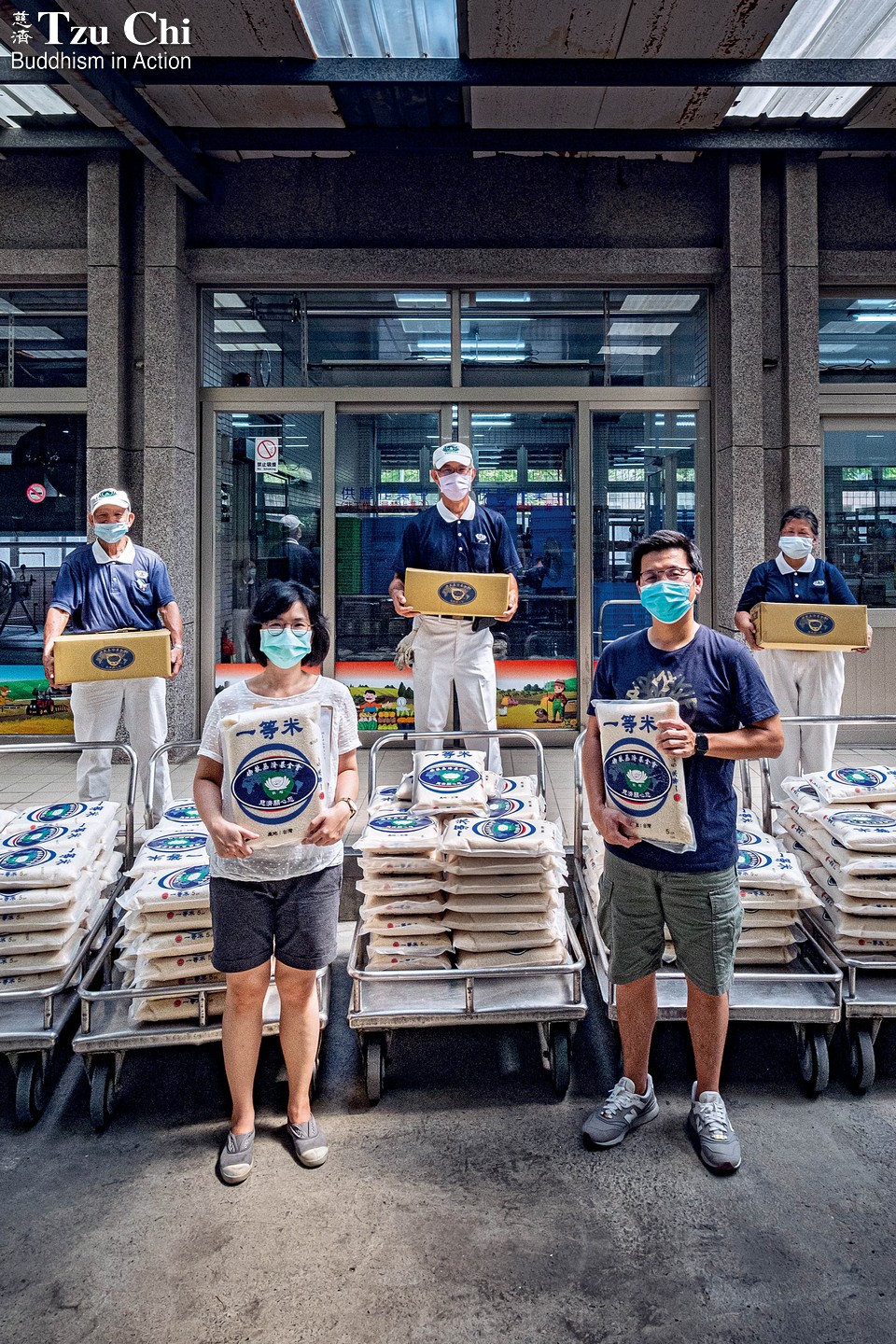
School representatives and Tzu Chi volunteers pose with food aid provided by the foundation at Dacheng Junior High School in Tainan.
Tzu Chi volunteers in Kaohisung City, southern Taiwan, took action to help in this area too. Volunteer Xu Qing-zong (許清棕) started collecting second-hand computers when the COVID situation became serious in Taiwan in mid-May. He repaired, maintained, and reassembled them, then gave them to disadvantaged students to use. He has so far donated 70 computers to students from needy families in Kaohsiung and its southern neighbor, Pingtung County.
Volunteer Pan Ji-li (潘機利), also a resident of Kaohsiung, owns a garment retail business. His stores happened to be replacing their computers with new models. He donated the replaced but still serviceable computers—15 of them— to students who needed them. He was pleased that the still usable equipment could serve a good purpose.
Children who received the donated computers were overjoyed. One example was a brother and sister whose father was serving time in prison. Their mother had to work to support the family, and so the siblings were cared for by their grandmother. When volunteer Ke Xiu-huan (柯琇環) discovered that the brother and sister were taking turns using a cell phone to learn remotely, her heart went out to them. To remedy the situation, she and other volunteers delivered two computers to the children, set the devices up, and connected them to the Internet. “It will be a lot easier for them to do their homework now,” the grandmother said gratefully. This is but one example among many of volunteers seeing a need and doing their best to meet it to relieve the plight of underserved people.
The impact of the pandemic is such that no one has been spared. As it is said in the movie Room, “No one is strong alone.” Mutual help and support are key to pulling everyone through this collective challenge.

